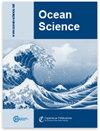Response of the Arctic sea ice–ocean system to meltwater perturbations based on a one-dimensional model study
IF 3.3
3区 地球科学
Q2 METEOROLOGY & ATMOSPHERIC SCIENCES
引用次数: 0
Abstract
Abstract. A one-dimensional coupled sea ice–ocean model is used to investigate how the Arctic Ocean stratification and sea ice respond to changes in meltwater. In the control experiments, the model is capable of accurately simulating seasonal changes in the upper-ocean stratification structure compared with observations, and the results suggest that ocean stratification is important for ice thickness development during the freezing season. The sensitivity experiments reveal the following: (1) a decrease in meltwater release weakens ocean stratification and creates a deeper, higher-salinity mixed layer. (2) Meltwater reduced ice melting by 17 % by strengthening ocean stratification. (3) The impact of meltwater released during the previous melting season on ice growth in winter depends on the strength of stratification. After removing all the meltwater during the summer, ice formation in areas with strong stratification increased by 12 % during the winter, while it decreased by 43 % in areas with weak stratification. (4) In some areas of the Nansen Basin where stratification is nearly absent, the warm Atlantic Water can reach the ice directly in early spring, leading to early melting of the sea ice in winter if all meltwater is removed from the model. These findings contribute to our understanding of the complex interactions between ocean stratification, meltwater and sea ice growth and have important implications for climate models and future change prediction in the Arctic.基于一维模型研究的北极海冰-海洋系统对融水扰动的反应
摘要。利用一维海冰-海洋耦合模式研究了北冰洋分层和海冰对融水变化的响应。在对照实验中,与观测结果相比,该模式能够准确地模拟上层海洋分层结构的季节性变化,结果表明海洋分层对冰冻季节冰厚度的发展非常重要。敏感性实验揭示了以下几点:(1)融水释放量减少会减弱海洋分层,形成更深、含盐量更高的混合层。(2) 融水通过加强海洋分层,使冰层融化减少了 17%。(3) 上一个融化季节释放的融水对冬季冰层生长的影响取决于分层的强度。在去除夏季的所有融水后,分层作用强的地区冬季成冰量增加了 12%,而分层作用弱的地区成冰量减少了 43%。(4) 在南森盆地几乎没有分层的一些地区,如果从模型中去除所有融水,温暖的大西洋海水可在早春直接到达冰层,导致冬季海冰提前融化。这些发现有助于我们理解海洋分层、融水和海冰生长之间复杂的相互作用,对气候模型和北极未来变化预测具有重要意义。
本文章由计算机程序翻译,如有差异,请以英文原文为准。
求助全文
约1分钟内获得全文
求助全文
来源期刊

Ocean Science
地学-海洋学
CiteScore
5.90
自引率
6.20%
发文量
78
审稿时长
6-12 weeks
期刊介绍:
Ocean Science (OS) is a not-for-profit international open-access scientific journal dedicated to the publication and discussion of research articles, short communications, and review papers on all aspects of ocean science: experimental, theoretical, and laboratory. The primary objective is to publish a very high-quality scientific journal with free Internet-based access for researchers and other interested people throughout the world.
Electronic submission of articles is used to keep publication costs to a minimum. The costs will be covered by a moderate per-page charge paid by the authors. The peer-review process also makes use of the Internet. It includes an 8-week online discussion period with the original submitted manuscript and all comments. If accepted, the final revised paper will be published online.
Ocean Science covers the following fields: ocean physics (i.e. ocean structure, circulation, tides, and internal waves); ocean chemistry; biological oceanography; air–sea interactions; ocean models – physical, chemical, biological, and biochemical; coastal and shelf edge processes; paleooceanography.
 求助内容:
求助内容: 应助结果提醒方式:
应助结果提醒方式:


